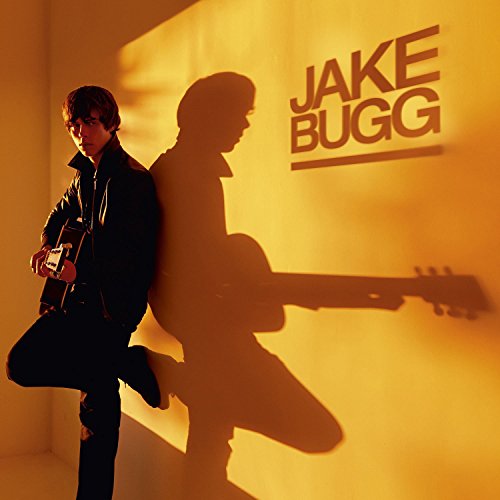
Jake Bugg
Shangri La
Release Date: Nov 19, 2013
Genre(s): Alternative/Indie Rock
Record label: Island / Def Jam
Music Critic Score
How the Music Critic Score works
Buy Shangri La from Amazon
Album Review: Shangri La by Jake Bugg
Acceptable, Based on 9 Critics
Based on rating 4
Someone must have bought Jake Bugg a Skiffle compilation and Woody Guthrie’s Best Of in the time since his first album sent the Oasis-deprived massive into lager-throwing hysterics. With new Rick Rubin produced album Shangri La – named after the Californian studio in which it was made – it’s another day, another cracking little record from the boy Bugg. Smug, smarmy, metropolitan critics might declare the album generic and derivative, but the kid undeniably has tunes – more tunes than such people have ever written even in their wildest rock star fantasies.
Based on rating 3/5
"I wake up/Check my phone/Jump in my whip/And off I go," Jake Bugg sings on "Kingpin." It's a song about the lush life of a drug dealer with a steelback giddyap that connects Eddie Cochran to the Smiths' "What Difference Does It Make?" And that knack for yoking today's restless energy to yesterday's jangle is what makes the 19-year-old U.K. chart-topper likable. Bugg's debut was at its best giving '62 Dylan and Buddy Holly a cocky Oasis charge, and the Bugg Man backed it up by calling fellow roots lovers Mumford & Sons "posh farmers with banjos." Dude has balls as big as Rickenbackers.
Based on rating 3/5
A cynic might suggest that the swift turnaround between Jake Bugg’s first album and its follow-up owes less to the way Dylan and Donovan used to churn them out, and more to Bugg’s dwindling proximity to his favourite subject, the mean crescents of Clifton. That cynic may just be onto something, too – leave it any longer, be photographed on the arm of another London socialite, and kitchen-sink shanties like ‘Slumville Sunrise’ or ‘Messed Up Kids’ might start to sound as inauthentic as the talent-show wannabes he has a habit of turning his ire towards. Forgetting where you came from is one thing, but pretending it’s still where you’re at can be just as foolish.
Based on rating 3/5
Bugg's second album opens with the kind of high-speed wordiness and skiffley jangle that he does best – scrappy and audibly northern throwback rock that splits the difference between Arctic Monkeys and Oasis. But this is not always a wholly good thing: that Gallagherish delivery, all nasal protraction, is pretty hard to take in an un-Wonderwalled world and on What Doesn't Kill You he sounds like a newly humanoid cat, plaintive and struggling to shape its vowels ("you" becomes "yawowrhr"). There's an endearing, if slight love song in Me and You but the attempt at social commentary (Messed Up Kids) is a lot less successful.
Based on rating 6/10
In every ejaculation there are 600 million sperm, two thirds of which could have ended up being Jake Bugg. That’s 400,000,000 decent singing voices. 400,000,000 knacks with melody. 400,000,000 Shangri Las. Each one could have done it. One of those sperm had to make it to the ovum against ….
Based on rating 4/10
Where did it go? The pure rush of “Lightning Bolt”? The aching, nostalgia of “Simple As This”? The warm afterglow of “Broken”? From the first bouncy notes of Shangri La, it’s clear that Rick Rubin declined (somewhat contrary to his usual approach) to strip away sound and instead felt inclined to add more. Why, exactly, are we bopping our heads to “There’s a Beast and We All Feed It”? One wonders whether Rubin even gave Bugg’s dark, thoughtful lyrics a read before laying down the arrangement; either way, in no universe does Bugg’s intoning, “There’s a beast eating every bit of beauty / And, yes, we all feed it” amidst shimmying bass and bright electric guitar make any sense. The takeaway here is that while Bugg’s debut album felt genuine, Shangri La feels forced and awkward.
Based on rating 4/10
Jake Bugg's eponymous 2012 debut was enough of a success to push him into neo-stardom across the Atlantic Ocean. He never had an actual hit in America -- the album did get to 75 on the Billboard 200, though -- but his reputation was strong, strong enough to gain the attention of Rick Rubin, who signed up to record the young British singer/songwriter's sophomore album at the producer's home studio. Literal guy that he is, Bugg named his second album Shangri La after Rubin's Malibu studio, and it's an appropriate title because it's a collection of 12 songs that were recorded at Shangri La.
Based on rating 2/5
Jake Bugg's second album takes its title from the studio in which it was made. You can hardly blame him for wanting to draw attention to the place it was recorded. Two years after his debut album arrived, bearing gritty tales of drugs and violence on a Nottingham council estate, the 19-year-old finds himself making the follow-up on Morning View Drive, Malibu, with arguably the most famous producer in the world, Rick Rubin.
Opinion: Mediocre
A year ago this English singer-songwriter was largely unknown in the U.S. despite the fact that his self-titled debut had entered the British chart at No. 1. Today Jake Bugg is still largely unknown here, but the folks who do know him are people of influence. Thus "Shangri La," Bugg's second album ….
'Shangri La'
is available now

